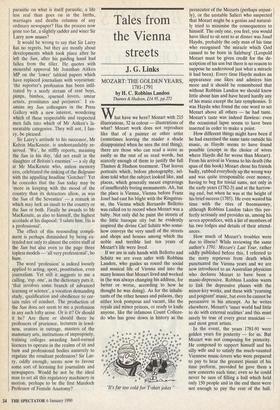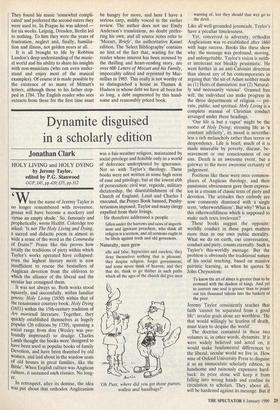Tales from the Vienna streets
J. G. Links
MOZART: THE GOLDEN YEARS, 1781-1791 by H. C. Robbins Landon Thames & Hudson, £14.95, pp.272
hat have we here? Mozart with 215 illustrations, 32 in colour — illustrations of what? Mozart work does not reproduce like that of a painter or other artist (sometimes leaving the reader a shade disappointed when he sees the real thing); there are those who can read a score as easily as the rest of us read words, but scarcely enough of them to justify the full Thames & Hudson treatment. That leaves portraits which, before photography, sel- dom told what the subject looked like, and places, which generally meant engravings of insufferably boring monuments. Ah, but the place is Vienna, Vienna before Franz Josef had cast his blight with the Ringstras- se, the Vienna which Bernardo Bellotto was called on to record when Mozart was a baby. Not only did he paint the streets of the little baroque city but he evidently inspired the divine Carl Schutz who some- how conveys the very smell of the streets and shops and houses among which the noble and terrible last ten years of Mozart's life were lived.
If we are in safe hands with Bellotto and Schutz we are even safer with Robbins Landon, who guides us round the social and musical life of Vienna and into the many houses that Mozart lived and worked in (he was always changing his address, for better or worse, according to how he thought he was doing). As for the inhabi- tants of the other houses and palaces, they either look pompous and vacant, like the royals and minor princes, or ready to knife anyone, like the infamous Count Collore- do who has gone down in history as the 'It's far too cold for T-shirt jokes ' persecutor of the Mozarts (perhaps unjust- ly), or the unstable Salieri who suspected that Mozart might be a genius and natural- ly tried to minimise the consequences to himself. The only one, you feel, you would have liked to sit next to at dinner was Josef Haydn, probably the only man of his time who recognised 'the miracle which God caused to be born in Salzburg' (Leopold Mozart must be given credit for the de- scription of his son but there is no reason to suppose he understood just what a miracle it had been). Every time Haydn makes an appearance one likes and admires him more and it should be remembered that without Robbins Landon we should know little about him and have heard hardly any of his music except the late symphonies. It was Haydn who found the one word to set Mozart above all others — he had taste. Mozart's taste was indeed flawless: even the occasional lapse seems to have been inserted in order to make a point.
How different things might have been if he had exercised the same taste outside his music, as Haydn seems to have found possible (except in the choice of wives where Haydn did far worse than Mozart). From his arrival in Vienna to his death (the span of this book) Mozart chose his friends badly, rubbed everybody up the wrong way and was quite irresponsible over money, having to beg for trivial sums, not only in the early years (1782-3) and at the harrow- ing end, but when he was at the height of his brief success (1785). He even wasted his time with the rites of freemasonry, although Robbins Landon takes this per- fectly seriously and provides us, among his seven appendices, with a list of members of his two lodges and details of their attend- ances.
How much of Mozart's troubles were due to illness? While reviewing the same author's 1791: Mozart's Last Year, rather oddly published before this, I referred to the many reprieves from death which punctuated the Vienna years and we are now introduced to an Australian physician who declares Mozart to have been a manic-depressive. Robbins Landon wants to link the depressive phases with the minor-key works, and these with 'yearning and poignant' music, but even he cannot be persuasive in his attempt. As he writes elsewhere, Mozart's 'inner world had little to do with external realities' and this must surely be true of every great musician and most great artists.
In the event, the years 1781-91 were golden years for posterity — for us. But Mozart was not composing for posterity. He composed to support himself and his silly wife and to satisfy the much-vaunted Viennese music-lovers who were prepared to pay to hear the greatest pianist of his time perform, provided he gave them a new concerto each time; even so he could never be sure of filling a hall which held only 150 people and in the end there were not enough to pay the rent of the hall. They found his music 'somewhat compli- cated' and preferred the second-raters they were used to. In Prague he was adored for six weeks. Leipzig, Dresden, Berlin led to nothing. To him they were the years of frustration, neglect and, finally, humilia- tion and illness, not golden years at all.
It is all brought to life by Robbins Landon's deep understanding of the music- al world and his ability to share his insights with non-musicians (who can even under- stand and enjoy most of the musical examples). Of course it is made possible by the existence of so many of Mdzart's letters, although those to his father stop- ped in 1784. The English reader who sees extracts from these for the first time must
be hungry for more, and here I have a serious carp, mildly voiced in the earlier review. The author does not use Emily Anderson's translations, no doubt prefer- ring his own, and all source notes refer to `Mozart, Briefe', the authoritative Kassel edition. The 'Select Bibliography' contains no hint of the fact that, waiting for the reader whose interest has been aroused by the thrilling and heart-rending story, are over 600 Letters of Mozart and his Family, impeccably edited and reprinted by Mac- millan in 1985. This really is not worthy of so distinguished a house as Thames & Hudson in whose debt we have all been for so long, a debt augmented by this hand- some and reasonably priced book.











































 Previous page
Previous page